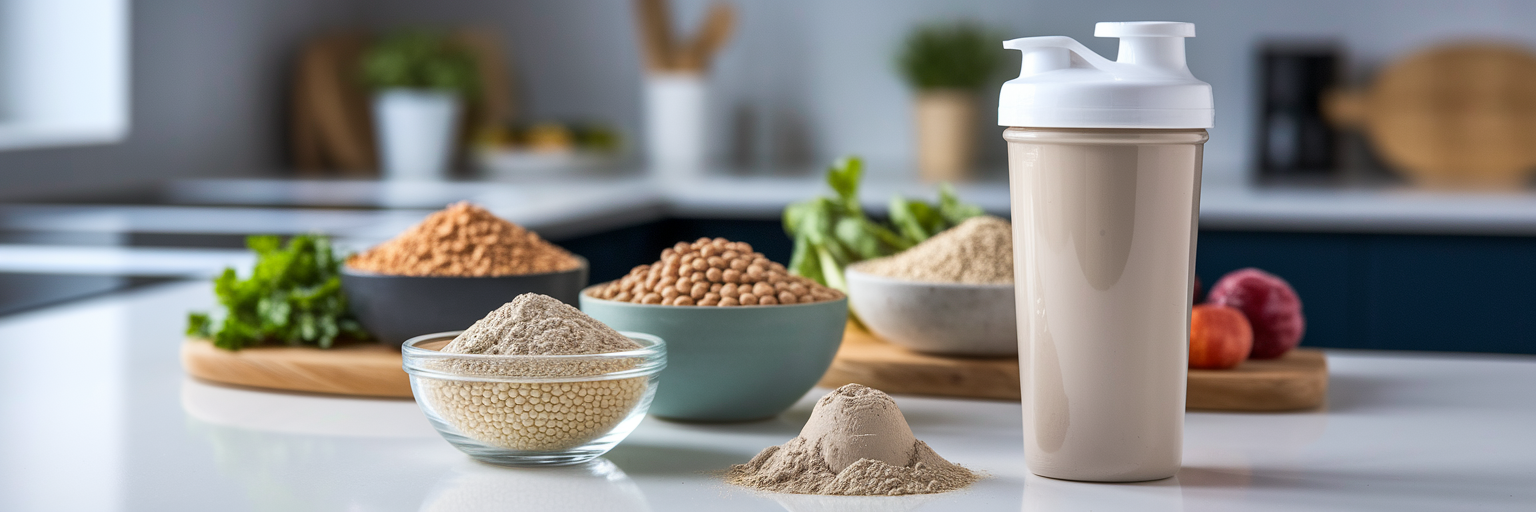Understanding Muscle Recovery and Protein's Function
We all know that satisfying ache after a great workout. It’s the feeling that tells you you’ve pushed your limits and are on your way to getting stronger. That soreness is the result of microscopic tears in your muscle fibers. But this isn't damage to be feared; it's a necessary signal that your body is ready to rebuild and grow.
This rebuilding process is called Muscle Protein Synthesis (MPS). Think of it like a construction crew arriving at a job site. After your workout, this crew gets to work repairing the muscle tissue, making it stronger and more resilient than before. But for this crew to do its job, it needs the right materials. Those materials are proteins, specifically the building blocks they're made of: Essential Amino Acids (EAAs).
Our bodies can't produce EAAs on their own, so we must get them from our diet. Among these, a special group called Branched-Chain Amino Acids (BCAAs)—leucine, isoleucine, and valine—are particularly important for muscle repair. Leucine, in particular, acts as the foreman of the construction crew. It’s the "on-switch" that initiates the entire MPS process. Without enough leucine, the repair work can't begin efficiently. Understanding this simple biological fact is the first step in learning how to improve muscle recovery and get the most out of every training session.
How Plant-Based Proteins Support Muscle Repair
For years, a common myth suggested that plant-based proteins were somehow inferior for building muscle. The main concern was about them being "incomplete." While it's true that some individual plant sources might be lower in one or two essential amino acids, this view is outdated. The solution is beautifully simple: combine different plant protein sources.
By mixing proteins from various plants, you easily create a robust and complete amino acid profile. This is why modern vegan protein powders often blend pea, rice, and pumpkin seed protein. Pea protein, for instance, is naturally high in BCAAs, while soy protein is one of the few complete protein plant sources on its own. It's not about finding one perfect plant, but about creating a powerful team.
Science has caught up to this reality. In fact, a 2024 systematic review published via the National Center for Biotechnology Information (NCBI) concluded that plant-based proteins effectively support recovery from resistance exercise, challenging outdated beliefs. When matched for leucine content, plant proteins perform on par with their dairy-based counterparts for muscle growth. This isn't just theory; it's a scientifically validated approach to fueling your body. And it's easier than you think. You can find inspiration in some easy vegan protein recipes you'll actually crave.
A Closer Look at Plant Protein Versus Whey
When choosing a protein powder, the plant based protein vs whey debate is one of the most common. Both can be effective, but they work in slightly different ways, and understanding these differences can help you choose what's best for your body and goals.
Digestion Speed: A Tale of Two Timelines
Whey protein is known for its rapid absorption. It delivers amino acids to your muscles very quickly, creating a fast spike that’s great for immediately after a workout. Plant proteins, on the other hand, often digest more slowly. This provides a more sustained, steady release of amino acids over a longer period. This can be a significant advantage, helping to fuel muscle repair for hours and keeping you feeling full longer.
The Leucine Factor: Closing the Gap
Whey naturally contains a higher concentration of the BCAA leucine per gram. However, this is an easy gap to close. You can either have a slightly larger serving of your vegan protein or, even better, choose a modern blend that is fortified with extra leucine. Many top-tier formulas, like our Chocolate Vegan Protein, are specifically designed with an optimized amino acid profile to support performance, making this a non-issue.
More Than Muscle: The Added Perks of Plants
Plant-based proteins come with benefits that go beyond muscle repair. They are often rich in fiber, which is crucial for digestive health, and packed with vitamins, minerals, and antioxidants. These compounds can help manage exercise-induced inflammation, offering a more holistic approach to recovery. Plus, they are naturally free of lactose and dairy, making them an excellent choice for anyone with sensitivities.
| Feature | Plant-Based Protein | Whey Protein |
|---|---|---|
| Primary Source | Peas, soy, rice, pumpkin seed, etc. | Cow's milk (dairy) |
| Digestion Speed | Generally slower, sustained release | Very fast, rapid spike |
| Common Allergens | Free of dairy and lactose | Contains lactose and milk proteins |
| Added Nutrients | Often rich in fiber, vitamins, and antioxidants | Primarily focused on protein content |
| Leucine Content | Can be lower; often fortified in blends | Naturally very high |
This table summarizes the key functional differences between typical plant-based and whey proteins. The choice often depends on individual dietary needs, digestion, and recovery timing preferences.
Practical Tips for Maximizing Muscle Recovery
Using the right protein is just one piece of the puzzle. To truly optimize your recovery, you need a smart strategy. Here are four practical tips to help you repair, rebuild, and come back stronger after every workout.
- Time Your Protein Intake. To give your muscles the resources they need right away, aim to consume a vegan protein shake or a protein-rich meal within the 30 to 60-minute "anabolic window" after your workout. This helps kickstart the muscle protein synthesis process when your body is most receptive.
- Get the Right Dosage. To ensure you’re activating that all-important leucine switch, aim for a serving that provides 30-40 grams of high-quality vegan protein. This amount is generally sufficient to trigger a strong muscle-building response, making it a key strategy for finding the best vegan protein for muscle gain.
- Embrace Dietary Diversity. Don't rely solely on powders. Throughout the day, incorporate a wide variety of whole-food plant proteins into your meals. Foods like lentils, chickpeas, tofu, tempeh, quinoa, and nuts not only provide protein but also deliver a full spectrum of vitamins, minerals, and fiber that support overall health and recovery.
- Consider Complementary Aids. Other supplements can work alongside your protein to enhance recovery. Algae-based omega-3s can help manage inflammation, which is a natural part of the recovery process. Another powerful, vegan-friendly supplement worth exploring is creatine, which has extensive research backing its benefits for strength and performance.
Innovations in Vegan Protein Formulation
The world of plant-based nutrition has come a long way from gritty, single-source powders. Today, the most effective vegan proteins are the result of intelligent formulation. Brands are now creating sophisticated blends that combine multiple plant sources—like pea, pumpkin seed, and sunflower—to craft a complete and potent amino acid profile that rivals anything on the market.
Even more, leading products are now fortified with additional free-form EAAs, especially leucine. This ensures that every scoop delivers the optimal amount needed to stimulate muscle growth effectively. The result is a product that is functionally equivalent to dairy-based proteins for muscle repair.
Ultimately, using vegan protein for muscle recovery is no longer a compromise. It’s a powerful, sustainable, and highly effective choice for any athlete looking to optimize their performance and health. The evolution of plant-based nutrition means there are more high-quality options than ever. We invite you to explore our full collection of products to find the perfect fit for your fitness journey.




